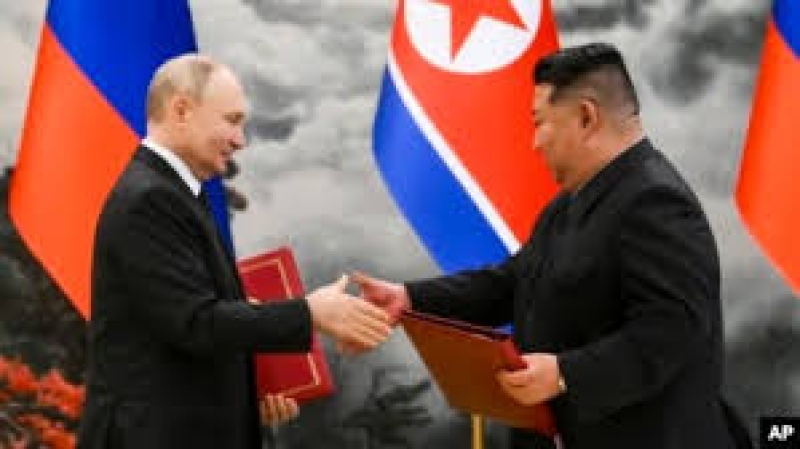- Intimidation or bloodshed cannot halt Bangladesh’s march to democracy |
- Khaleda Zia integral to an important chapter in BD history: Yunus |
- Enthusiasm marks Victory Day celebrations across Bangladesh |
- Dhaka-Delhi ties deep; to be shaped by trust, dignity, mutual respect |
- EU deploys election observation mission to Bangladesh |
Signs emerge North Korea-Russia defense pact

The United States is carefully studying a new mutual defense pact between Russia and North Korea, which Washington believes could aid Pyongyang in its nuclear and long-range missile development programs.
There are also signs of tensions between North Korea and its longstanding ally, China, following the signing of the agreement.
China anxious
In a keynote address on sustaining U.S. strategy in the Indo-Pacific at the Council on Foreign Relations Monday, Deputy Secretary of State Kurt Campbell said China is probably worried that North Korea will be encouraged to take provocative steps that could lead to a crisis in Northeast Asia.
“I think it is fair to say that China is somewhat anxious about what's going on between Russia and North Korea. They have indicated so in some of our interactions, and we can see some tension associated with this,” Campbell said.
Campbell said he had a call with South Korean officials Sunday night to discuss next steps to enhance deterrence more clearly.
"We believe that that there are discussions about what North Korea gets in exchange [from the deal with Russia] and they could be associated with its nuclear, long range missile development plans," he said.
Last week, Russian President Vladimir Putin visited Pyongyang for the first time in more than 20 years. U.S. officials have said while there are limits to their partnership, it cannot be ignored, reports VOA.
The State Department's second-ranking diplomat also voiced concerns over China and North Korea's support for Russia's efforts to rebuild its defense industrial base since the start of its war on Ukraine.
South China Sea tensions
Campbell said Washington has “significantly démarched Chinese interlocutors” following what he called “Beijing's military provocations” in the South and East China Sea and near the waters around the Second Thomas Shoal, known as Rénài Jiao in China and Ayungin Shoal in the Philippines.
According to an international tribunal's legally binding decision issued in July 2016, the Second Thomas Shoal is located within the exclusive economic zone of the Philippines, and China has no lawful maritime claims to the waters around this low-tide feature. Beijing has rejected the ruling.
“The Philippines are very cautious at this juncture. They do not seek a crisis with China. They are seeking dialogue,” Campbell said. “They're seeking discussion, and they want the United States to be purposeful with other allies and partners about our goals to maintain peace and stability and to send a very clear message of deterrence and reassurance.”
However, he stopped short of stating whether Washington would invoke a mutual defense treaty with Manila. "I'm not going to speculate in public. I will say we have continually reaffirmed its significance and relevance to these situations at the highest level," he said.
In a phone call with Philippine Undersecretary of Foreign Affairs Maria Theresa Lazaro last week, Campbell reaffirmed that Article IV of the 1951 United States-Philippines Mutual Defense Treaty extends to armed attacks on Philippine armed forces, public vessels, or aircraft — including those of its coast guard — anywhere in the South China Sea, according to the State Department.

